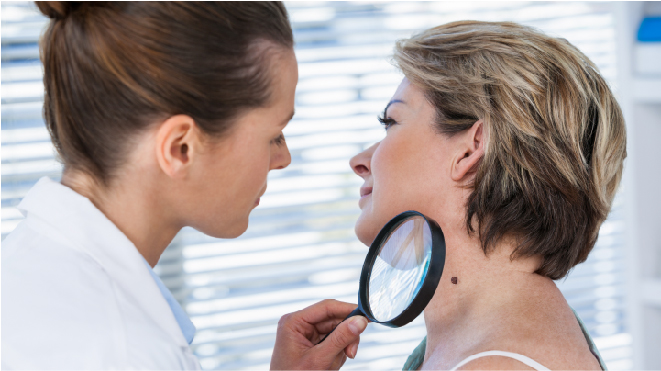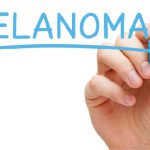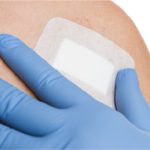Skin cancer can develop in any part of the body, but most often it is developed on skin that is more exposed to the UV radiation. Skin cancer occurs to people of all skin tones. Read more about skin cancer here.

Skin cancer:
Skin cancer can be caused due to a number of inherited conditions, lifestyle, race and other factors, but the exact cause of most skin cancers is yet to be found. Few changes in a DNA sequence can turn the skin cells cancerous. Also, direct exposure to the sunlight, and UVA and UVB radiation is the main cause of the development of skin cancer.
Skin cancer risk factors:
Anything which increases the possibility of getting the disease/cancer is known as a risk factor. On the contrary, having no such risk factors doesn’t essentially mean one cannot get a disease. The following are the factors which increase the risk of skin cancer:
Ultraviolet (UV) light:
Ultraviolet (UV) radiation emitted by the sun can damage skin cells and genes, which makes it a major risk factor for skin cancer. Tanning lamps and booths are also capable of emitting UV radiation. High levels of exposure to UV light may create a greater risk for skin cancer. The measure of UV exposure is the strength of light, time period of exposure, coverage of skin with clothes or sunscreen. People with exposure to a year round, bright sunlight might have a higher risk of developing skin cancer.
Fair skin
The risk of skin cancer is considerably high for light skinned toned people than for darker skin toned people. The reason being, melanin, the pigment that plays a key role in protection against the UV radiation is responsible for the colour of the skin, people with dark coloured skin have more melanin than fair toned ones. People with light coloured skin which freckles or burns a lot often and easily are at considerably high risk.
Older age:
The risk of cancers of skin increases with age. People in their old age who may have been exposed to the sun for a longer duration of time are seen to be at risk. However, the cancer is now often seen in younger people to, owing to fact of them spending their time in the sun without skin protection.
Gender:
Men are twice at risk than women to some types of skin cancers and about thrice for others. This could be accounted to the amount of time in the sun spent for the genders though.
Chemicals:
The risk of skin cancer increases with exposures to larger amounts of arsenic which is used in making of some insecticides. It sometimes may also be found in well water in some areas. Workers who may have been exposed to industrial tar, coal, paraffin, and certain types of oil are noted to have an increased risk of getting skin cancer.
Radiation:
People who may have undergone radiation treatment have a risk of acquiring a skin cancer in the treated area. The risk is even higher in children who have been exposed to radiation therapy at a young age.
History of skin cancer:
People who have had one keratinocyte cancer in the past have much of a chance at having another one.
Certain long-term or severe skin problems:
A small risk of skin cancer exists for people with scars because of bad burns, areas of skin over bone infections and skin damaged by certain skin diseases as they are likely to develop into skin cancer.
Psoriasis treatment:
Some patients with a long-lasting inflammatory skin disease may be treated with psoralen and ultraviolet light treatments (PUVA). This increases risk of getting skin cancer, and maybe other skin cancers.
Family diseases:
Xeroderma pigmentosum is a rare inherited disease which makes the skin very unable to repair damage caused by the sun or decrease the capacity to repair the damage. People with this disease have a higher risk of acquiring many skin cancers, some starting in childhood itself. Basal cell nevus syndrome is a rare condition which is present at time of birth and is considered inherited. This syndrome may cause cancers in some people.
Weakened immune system:
Cancer seems to develop in people with weak immune systems. Medication is given to people who had organ transplantations to weaken their immune system so the body can accept the organ. Skin cancers in people with weak immune systems tend to grow quickly and are more likely to cause death.
HPV infection:
Human papillomavirus (HPV) can be linked with a considerable amount of skin cancers. These are a group of viruses that can cause warts in the genital areas and anus, which can be linked to skin cancers in those areas.
Smoking:
Smoking can be a risk factor for few types of skin cancers but not for all.
Genetics:
Certain parts of the normal cells are more sensitive to being damaged by sunlight. Skin cancer after sun exposure is more likely in some people while others do not develop any kind of skin cancer even after the same amount of exposure. Extreme exposure to UV light are at greater risk for all types of skin cancer.
Moles:
A mole can be viewed as a non cancerous skin tumor. However, moles of certain kind may increase the chance of a person being affected with melanoma. It depends on the number of moles a person has is low, the chances are negligible. The risk increases with increase in number of moles.



